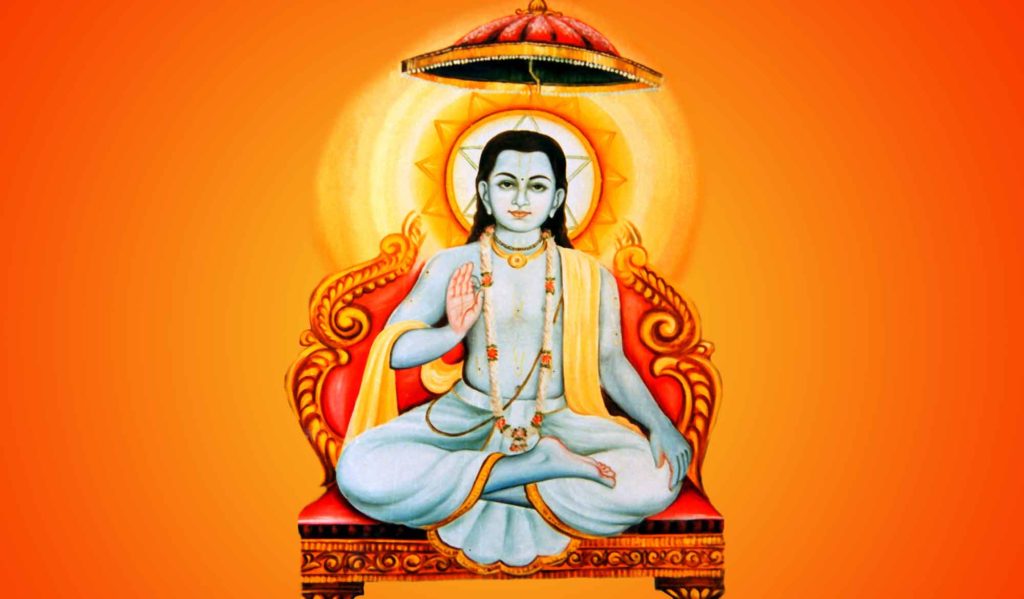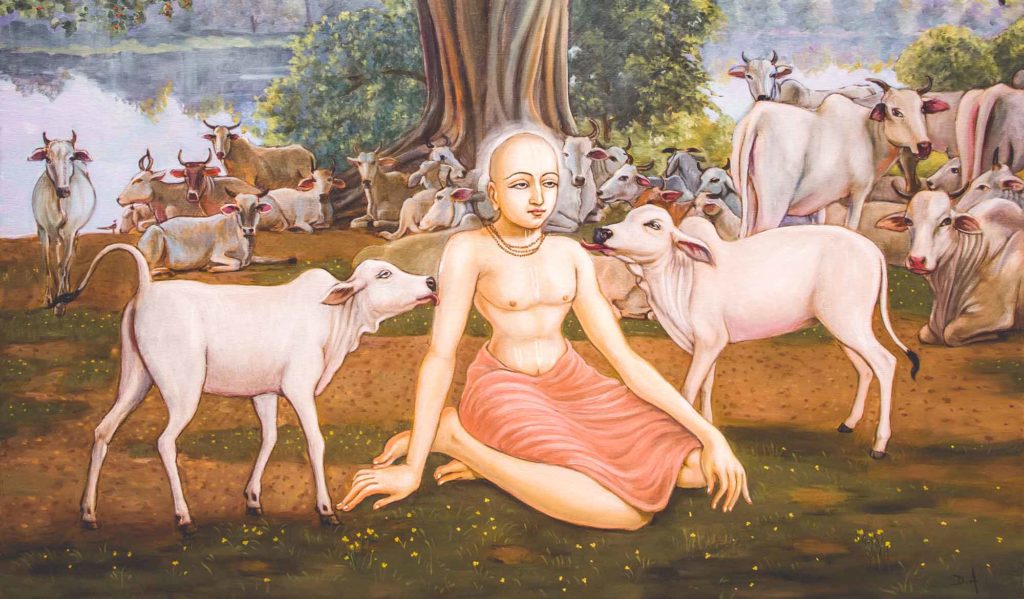Overview
In 'Conquering Anarthas' Dhīra Lalitā Dāsī answers the question 'what are anarthas and how do we rid ourselves of them?'. This article explains the nature of anarthas, the erratic mind, and how to remove unwanted desires from the heart.
Question: What are anarthas and how do we overcome them?
Answer: Anartha literally means those things which are unnecessary. In this case it refers to things that are unnecessary in our devotional development. Anarthas are sometimes also referred to as having separate interest from Kṛṣṇa. They generally come in the form of lust, anger, greed, pride, illusion and envy.
In order to eliminate anarthas we must first control the mind so that the desires of the mind can be purified. If we are able to control the mind, then we will be able to introspect and better understand what lies within the heart. The mind itself can be our greatest strength or greatest weakness.
For example, engaging in Deity worship while allowing the mind to meditate on mundane topics is the result of an uncontrolled mind. We can observe that our consciousness may not be very elevated, but by absorbing the mind in serving the Deity it can slowly become purified.
We must give this kind of attention to all services and not simply to our own needs. By fulfilling Kṛṣṇa’s desires, we feel inner satisfaction for acting with concentrated devotion. By watering the root of the tree (serving Kṛṣṇa) we become efficient, but by endeavouring to water each and every leaf (serving our various desires) we become unsteady. By fulfilling the Supreme Lord’s needs, then automatically our needs are taken care of.
The mind is always hovering over the bodily platform and if we don’t endeavour to elevate it, then it will constantly bother us with mundane demands. Unless we purify the mind, there is no question of becoming freed from material conditioning. As the mind becomes purified the desire to associate with Kṛṣṇa’s devotees also increases.
Aside from engaging in service, how else can the mind be purified?
Lord Śrī Caitanya Mahāprabhu came to give us the holy name, the yuga-dharma, the golden gift. By chanting the Hare Kṛṣṇa Mahā-Mantra and performing devotional service we can effectively purify the mind. This is the recommended process. We must also accept a bona-fide guru in a disciplic succession. When the guru is pleased then we can know that Kṛṣṇa is pleased. This guru-disciple relationship must be genuine for it to be effective.
Ultimately anarthas stem from our misidentification with the body. Śrīla Prabhupāda mentions this in the following purport to Śrīmad Bhāgavatam 7.5.32:
“Becoming Kṛṣṇa conscious brings about anartha-apagamah, the disappearance of all anarthas, the miserable conditions we have unnecessarily accepted. The material body is the basic principle of these unwanted miserable conditions.”
As long as we try to serve this material body we cannot have real freedom. Real freedom means to serve Śrī Kṛṣṇa and His devotees. Being bound by the chains of karma our nature is to act and react. This is a very limited experience. In the same purport Śrīla Prabhupāda continues:
“Bhaktivinoda Ṭhākura has explained that materialistic education expands the influence of māyā. Such an education induces the conditioned soul to be increasingly attracted to materialistic life and to stray further and further away from liberation from unwanted miseries.”
Materialistic education increases the bodily concept of life, thus Śrīla Prabhupāda recommended education for children with Kṛṣṇa at the centre. Śrīla Prabhupāda wanted serious practitioners who understand the value of this process.
Without becoming clear of anarthas we cannot and should not imitate higher Vaiṣṇavas.
“Sometimes someone is found imitating devotional love, but factually he or she is not freed from anarthas, or unwanted habits. It has been seen that a so-called devotee proclaims himself a follower of Nanda, Yaśodā, or the gopīs, while at the same time his abominable attraction for mundane sex life is visible. Such a manifestation of divine love is mere imitation and has no value. When one is actually spontaneously attracted to the loving principles of the gopīs, there will be found no trace of any mundane contamination in his character.” (Nectar of Devotion 16)
In order to attain spontaneous attraction to Kṛṣṇa, we must take shelter of the Lord and fully depend upon Him. Queen Kuntī prayed to Dvārakādīśa Kṛṣṇa to let there be calamities in order that that she could constantly remember Him.
vipadaḥ santu tāḥ śaśvat tatra tatra jagad-guro
bhavato darśanaṁ yat syād apunar bhava-darśanam
“I wish that all those calamities would happen again and again so that we could see You again and again, for seeing You means that we will no longer see repeated births and deaths.” (Śrīmad Bhāgavatam 1.8.25)
If we have no other shelter but Kṛṣṇa, then when we are in distress, we can remember Him easily. Yet someone who has a very comfortable lifestyle, who is overly ambitious to serve themselves, depends upon material nature. Such comfort becomes an impediment to their advancement just like a golden cage from which it is very difficult to escape. They are dependent on the cycle of their good or bad karma. This is an anartha – in other words, this is not necessary. We want to be in a situation that will allow us to remember Kṛṣṇa at every moment. Such a mentality leads to a renounced life.
“These desires, kāma, krodha, lobha – lust, anger, greed – they are strangers. They are not rightful residents of the heart or mind.” (Śrīla Śrīdhara Mahārāja)
Our ācāryas have stated with certainty that such anarthas cannot survive in a Kṛṣṇa conscious environment. At present, we have accumulated so much karma, so many bad habits, and so many sinful activities. We cannot ascertain how we have come to this world and this position that we are presently in, but we can understand where we are at by looking at ourselves and understanding our limitations. We should not be afraid to introspect at any moment and be very honest about our own position. Our own plight will help us to surrender to Kṛṣṇa. Without the help of Gaurāṅga Mahāprabhu, the yugāvatāra, we do not stand a chance.
“It is not very easy to get out of these bad habits, but when the devotee comes to realise with a faithful attitude the position and reality of the soul, Supersoul, and Kṛṣṇa consciousness proper, these unwanted desires will vanish.” (Śrīla Śrīdhara Mahārāja)
Following in the footsteps of the Six Gosvāmīs we can perform bhajana for the pleasure of Mahāprabhu.
“The result of bhajana, glorification of Kṛṣṇa in the association of great saintly souls, is that these anarthas, these miserable desires, will go away.” (Śrīla Śrīdhara Mahārāja)
These ‘miserable desires’ are like prison. They are miserable for those who have them and others who have to tolerate them. Thus, it is imperative that we become free of these anarthas – not just for our own benefit, but also for the benefit of others. We do not want to remain an embarrassment or a burden to others, especially in the presence of our spiritual master.
The complete retirement of undesirable habits is called anartha-nivṛtti. Then and only then, will our real interest in Kṛṣṇa consciousness grow and we will get a taste (ruci). By Kṛṣṇa’s grace, our consciousness of Him will develop even more (asakti), then ecstasy will manifest (bhāva), and finally prema (love for Kṛṣṇa). Without freedom from these unwanted habits, we cannot progress. We risk the danger of becoming devoid of Vaiṣṇava association, or we will delude ourselves in the pleasant shadow-world of the sahajiyā (imitationist). In that regard, our relationship with Kṛṣṇa will remain a dream.
The will of Kṛṣṇa is paramount. There is no question of attaining prema before all anarthas are completely eradicated. Those who fool themselves into believing they have love of God without becoming free from anarthas, are like those who dream that they are awake, even though they are still soundly sleeping in bed.
Related Articles and Books
- 📖 Prākṛta-rasa Śata-dūṣaṇī – One Hundred Condemnations of Material Rasa (Book)
- 📖 Prākṛta-rasa Āraṇya Chedinī: Cutting the Jungle of Misconception (Book)
- 📖 The Authorized Sri Caitanya Saraswata Parampara (Book)
- Bhāi Sahajiyā (Part One) by Śrīla Bhaktisiddhānta Sarasvatī Ṭhākura
- Bhāi Sahajiyā (Part Two) by Śrīla Bhaktisiddhānta Sarasvatī Ṭhākura
- Vikrīḍitaṁ vraja-vadhūbhir by Śrīla Bhaktisiddhānta Sarasvatī Ṭhākura
- Ujjvala Nīlamaṇi by Śrīla Bhakti Rakṣaka Śrīdhara Deva Gosvāmī
- Fools Rush In Where Angels Fear to Tread by Śrīla Bhakti Rakṣaka Śrīdhara Deva Gosvāmī
- The Internal Meaning of Ratha Yātrā and Nāma Bhajana by Śrīla Bhakti Pramoda Purī Gosvāmī
- The Rāga-Patha is Above All by Śrīla Bhakti Gaurava Narasiṅgha Mahārāja
- Gītā-Govinda of Jayadeva Gosvāmī by Śrīla Bhakti Gaurava Narasiṅgha Mahārāja
- Gīta Govinda Revisited by Śrīla Bhakti Gaurava Narasiṅgha Mahārāja
- The Proof of Your Devotion by Śrīla Bhakti Gaurava Narasiṅgha Mahārāja
- Vraja Bhāva by Śrīla Bhakti Gaurava Narasiṅgha Mahārāja
- Anartha Nivṛtti by Śrīla Bhakti Gaurava Narasiṅgha Mahārāja
- Hearing From a Rāsikācārya by Śrīla Bhakti Gaurava Narasiṅgha Mahārāja
- The Standard for Higher Līlā Swami B.V. Giri & Swami B.B. Viṣṇu
- Conquering Anarthas by Dhīralalitā Dāsī
Further Reading
Prema Dhāma Deva Stotram with the Narasiṅgha Sevaka Commentary – Verses 61-65
In verses 61 to 65 of 'Prema Dhāma Deva Stotram', Śrīla Śrīdhara Mahārāja narrates the pastime of Śrī Caitanya at Caṭaka Parvata In Purī and explains how the scriptures produced by Brahmā and Śiva are ultimately searching for the personality of Mahāprabhu who is merciful too all jīvas, no matter what their social position.
Prabhupāda Śrīla Sarasvatī Ṭhākura’s Visit to Ayodhyā
With the forthcoming observance of Śrī Rāma Navamī, we present 'Prabhupāda Śrīla Sarasvatī Ṭhākura’s Visit to Ayodhyā' written by Śrīla Bhaktisiddhānta Sarasvatī Ṭhākura Prabhupāda from The Gaudīyā magazine, Vol 3. Issue 21/ In December 1924, after visiting Benares and Prāyāga, Sarasvatī Ṭhākura visited the birth-site of Śrī Rāmācandra in Ayodhyā.
Śaraṇāgati – The Only Path to Auspiciousness
In this article, 'Śaraṇāgati - The Only Path to Auspiciousness', Dhīra Lalitā Dāsī analyses the process of śaraṇāgati (surrender) beginning with śraddhā (faith). She also discusses the role of śāstra and the Vaiṣṇava in connection with surrender.
Ātma Samīkṣā – The Value of Introspection
In this article, "Ātma Samīkṣā – The Value of Introspection" Kalki Dāsa highlights the importance of introspection in the life of a devotee and especially in relation to the worldly environment that surrounds us. He also explains how transcendental sound influences our capacity to introspect.
Prema Dhāma Deva Stotram with the Narasiṅgha Sevaka Commentary – Verses 61-65
In verses 61 to 65 of 'Prema Dhāma Deva Stotram', Śrīla Śrīdhara Mahārāja narrates the pastime of Śrī Caitanya at Caṭaka Parvata In Purī and explains how the scriptures produced by Brahmā and Śiva are ultimately searching for the personality of Mahāprabhu who is merciful too all jīvas, no matter what their social position.
Prabhupāda Śrīla Sarasvatī Ṭhākura’s Visit to Ayodhyā
With the forthcoming observance of Śrī Rāma Navamī, we present 'Prabhupāda Śrīla Sarasvatī Ṭhākura’s Visit to Ayodhyā' written by Śrīla Bhaktisiddhānta Sarasvatī Ṭhākura Prabhupāda from The Gaudīyā magazine, Vol 3. Issue 21/ In December 1924, after visiting Benares and Prāyāga, Sarasvatī Ṭhākura visited the birth-site of Śrī Rāmācandra in Ayodhyā.
Śaraṇāgati – The Only Path to Auspiciousness
In this article, 'Śaraṇāgati - The Only Path to Auspiciousness', Dhīra Lalitā Dāsī analyses the process of śaraṇāgati (surrender) beginning with śraddhā (faith). She also discusses the role of śāstra and the Vaiṣṇava in connection with surrender.
Ātma Samīkṣā – The Value of Introspection
In this article, "Ātma Samīkṣā – The Value of Introspection" Kalki Dāsa highlights the importance of introspection in the life of a devotee and especially in relation to the worldly environment that surrounds us. He also explains how transcendental sound influences our capacity to introspect.








